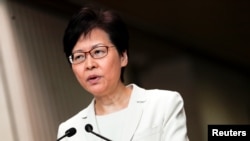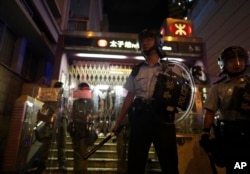Hong Kong’s embattled chief executive Carrie Lam may hope the withdrawal of a hated extradition bill will help the semi-autonomous Chinese city move forward from three months of major protests.
But if the initial reaction from activists, scholars and other Hong Kong residents is any indication, the protests may not go away any time soon, with protester demands having long ago expanded to include broader democratic reforms.
Lam on Wednesday announced the formal withdrawal of the extradition bill, a move she said was intended to “fully allay public concerns” after having earlier only suspended the proposal. But while the withdrawal essentially amounts to an admission that the extradition bill was a mistake, it seems few in Hong Kong see the move as a major concession.
“I haven’t heard anyone say they will stop protesting because of the withdrawal,” said Wilson Leung, who helped found the Hong Kong-based Progressive Lawyers Group. “Because a lot of the anger is now over police brutality and overreach.”
Months of protests, strikes
Since early June, Hong Kong has seen mass peaceful protests, widespread strikes, and occasional smaller groups of protesters who have clashed with police and attacked government symbols. The immediate cause of the protests was the extradition proposal. The legislation, if passed, would have allowed some criminal suspects to be sent to mainland China for trial.
Hong Kongers feared the bill would expose them to China’s politicized court system, where a trial virtually always results in a conviction.
But the protests underscored broader concerns about encroaching Communist Party influence in Hong Kong ahead of 2047, when a deal between China and Britain, Hong Kong’s former colonial power, is set to expire. Many feel Beijing’s “One Country, Two Systems” model, which allowed Hong Kong freedom of speech and the rule of law, has already hopelessly eroded.
By failing to make any major concessions at the outset, and instead responding violently to the protests, Hong Kong and Beijing authorities helped ensure the movement expanded and took on loftier goals, analysts say.
Protesters say they have five key demands: the full withdrawal of the extradition bill; an independent investigation into police violence; a retraction of the government’s characterization of the protests as riots; amnesty for arrested protesters; and universal suffrage for Hong Kong’s legislature and chief executive.
In her speech Wednesday, Lam said she could not fully meet protester demands, saying the government “may not be able to address all the grievances of people in society.” After Lam’s comments, many Hong Kong activists online and in the streets espoused the slogan: “Five key demands, not one less.”
‘Too little, too late’
“The concession made by Carrie Lam was too little too late,” said Willy Lam, a political analyst with the Chinese University of Hong Kong. “It should not have much impact on the situation in Hong Kong. The wave of protests will likely continue.”
The Chinese Communist Party may view the move as a major concession, since this is the “first time in many years that Beijing has needed to admit a mistake,” said the analyst Lam. “This is an open and full-fledged admission that the introduction of the extradition bill was a mistake.”
“However, most Hong Kong people have decided they want Beijing to honor the agreement with the British to grant Hong Kong a high degree of autonomy and also to allow Hong Kong a faster pace of democratic reforms,” he said. “These are conditions which Beijing has refused to grant.”
On Thursday, the Beijing-friendly chief executive insisted the withdrawal decision was made by her — not mainland leaders. That assertion comes after several reports suggested Chinese leaders were guiding the official response to the protest movement.
She also acknowledged that the protests have now made it “obvious to many of us that the discontentment in society extends far beyond” the extradition bill and covers “political, economic and social issues.”
Only 40 out of 70 members of Hong Kong’s legislature are elected by popular vote. The chief executive is chosen by an election committee that is heavily weighted toward Beijing.
Beijing has given no signs it will make democratic concessions. Instead, authorities in Hong Kong last week rounded up major pro-democracy figures. In total, more than 1,000 people have been arrested during the 13 weeks of protests.
Protesters also say they cannot afford to give in, especially since the demonstrations have exposed deeper problems beyond the extradition bill.
Joshua Wong, a prominent pro-democracy activist who last week found himself in legal trouble yet again for participating in unauthorized anti-government protests, warned against being “deceived by the Hong Kong and Beijing government.”
“They have conceded nothing,” he said in a tweet, adding: “A full-scale clampdown is on the way.”









